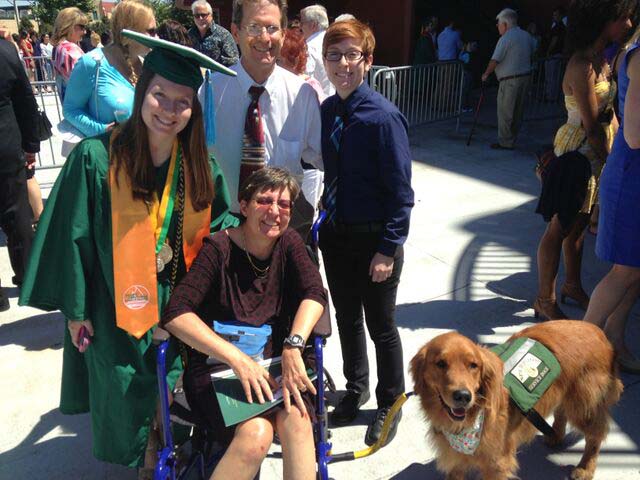His cape may not make him fly, but for Betsy Leon, that green service dog cape donned on Ray, her golden retriever, makes him a superhero in her book. As life’s irony would have it, after more than a decade of raising service dogs, Betsy found herself in the situation to need one.
Welcome to the Family
Ray assists Leon with everyday tasks and will warn others if a problem arises. He also accompanies Leon and her family – in his green cape – to many outings including her daughters’ graduations for the University of South Florida and Olympia High School this year. “Ray picks things up for me and speaks on command so I can notify others if there is a problem,” Leon says.
Walking a long distance proves difficult for Leon these days, and that’s an area that Ray can help with too. “He used to help me walk, now he walks with the chair,” she says.
Proudly, Ray helps propel Leon through the crowd, attached to her wheelchair by a leash invented by her husband, Mike. He modified a bike leash by shortening it so that Ray can be closer to Leon and still maintain the flexibility necessary to sit and lay down in large crowds without becoming a tripping hazard. And that’s how the Bike Tow Leash came to be.
More than a worker dog, Leon says Ray is also friend. “He will watch me swim for an hour in the pool and won’t chew on his treat until we get out,” she says. One of her favorite things about her dog is that although he will jump on others, Ray seems to understand limitations and has never jumped on Betsy.
Of course, a dog still has to have fun. Ray knows that when the cape comes off, he can play with the other dog in the house, Skylar, and just be a dog for a while.
Feeling Normal Again
So often people are surprised by situations that leave them still in their tracks. Still, that is, until they meet their service pets. In 1996, Erin Winnie was in an auto accident that caused a severe head injury. “I had no broken bones, just a broken brain,” she says.
Her injuries resulted in a body that was no longer able to function in any capacity. “Everything I knew how to do I could no longer apply. I had to re-learn all muscle functions: moving, speaking, swallowing, everything.”
Winnie’s body was unable to re-learn balance, leaving her unable to walk and dependent on a wheelchair for mobility. Then she met Lucky, a service horse residing at Freedom Ride, a nonprofit, volunteer-based organization dedicated to enriching the lives of those with disabilities through therapeutic horseback riding and related activities.
With severe spasticity on the left side of her body and minimal function on the right, Lucky provides Winnie the opportunity to “feel free and normal for a short time every Friday morning.” The wiggling that happens while Winnie rides Lucky relieves the spasticity in her muscles and forces her to use correct posture.
Since Freedom Ride is completely reliant on volunteers, people are needed to help with cleaning out stalls, grooming horses or cleaning tack. The organization also needs people that can do building repairs and ground maintenance. Each time Winnie rides Lucky, three volunteers are needed to help her keep her posture and balance.
Every service horse possesses something special that helps those who come to ride. As varied as people in personality, each horse with its different build and walking gait provides different levels of therapy for the riders. “Lucky makes my body relax,” says Winnie. Riding stretches the muscles her body has forgotten about. “It makes my brain wake up and works the parts of my body that are asleep.”
Creating a Special Bond
Little Ella Kraus, only four years old, is another who enjoys the bond with one of the horses at Freedom Ride. Every week begins with Ella asking her mom when she will get to see her horse friend, Bella. Bella provides hippotherapy for the sweet little girl. “My main focus was for Ella to strengthen her core in order for her to have more control of her breathing to further develop her speech,” her mom, Laura Kraus, explains.
“Ella gets super excited when we turn into the Freedom Ride driveway,” says Laura. Her time with Bella has helped improve Ella’s balance, body awareness, eye contact, following directions and her posture.
Winnie and Ella appreciate the gentleness and understanding that seem to emanate from their animals. “He knows me when we go up the ramp to get ready for riding,” says Winnie. “He’s happy to see me. He’s steady when they bring the electric lift to hoist me into the saddle, and he loves it when we bring him carrots and peppermints.”
Kraus believes the very best thing about Bella is the calmness and gentleness she gives to her daughter. “Bella always looks over at Ella and Ella gives her hugs and some nice pats before the session starts.” Once, after Ella gave Bella some carrots, Bella returned the reward with a few kisses on her cheek and arm, which, of course, Ella adored.
Kraus appreciates the warm and caring environment Bella, the volunteers and Freedom Ride have created for her daughter. She also loves the long-lasting friendships that have been formed with the volunteers. As Ella does her hippotherapy, the little girl doesn’t even know she’s working. Yet, as she rides for 30 minutes, she gets 30 minutes of stimulation. “Bella keeps Ella grounded,” says Kraus.
Service animals are nothing short of life changing for those that are their people. Winnie has had the joy of riding Lucky for a very long time. “I was his first rider after his training to be a therapeutic horse. He’s special to me,” she says. “Lucky used to be a race horse and his real name is Thank My Lucky Stars, and I am lucky that he is a part of my life.”







Comments